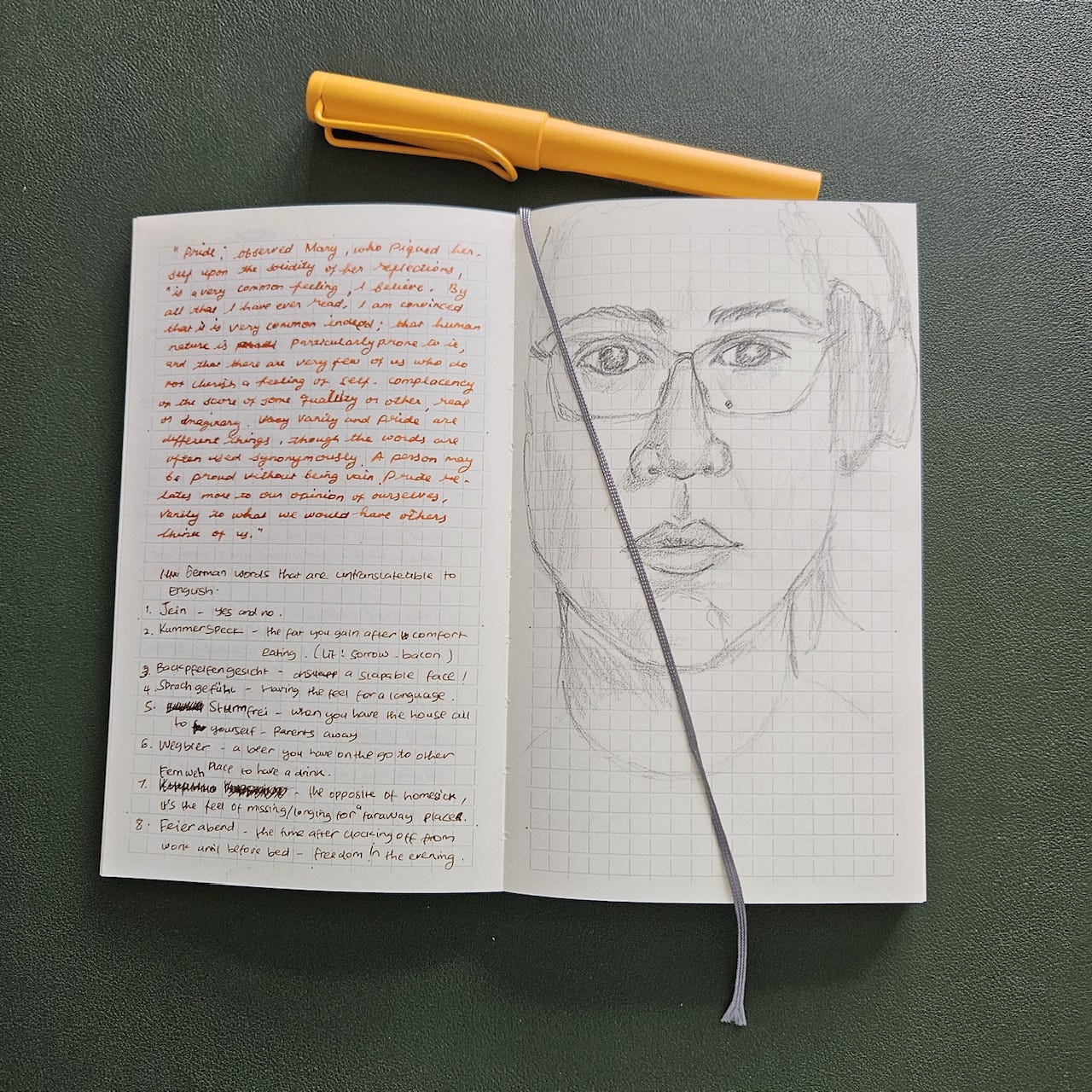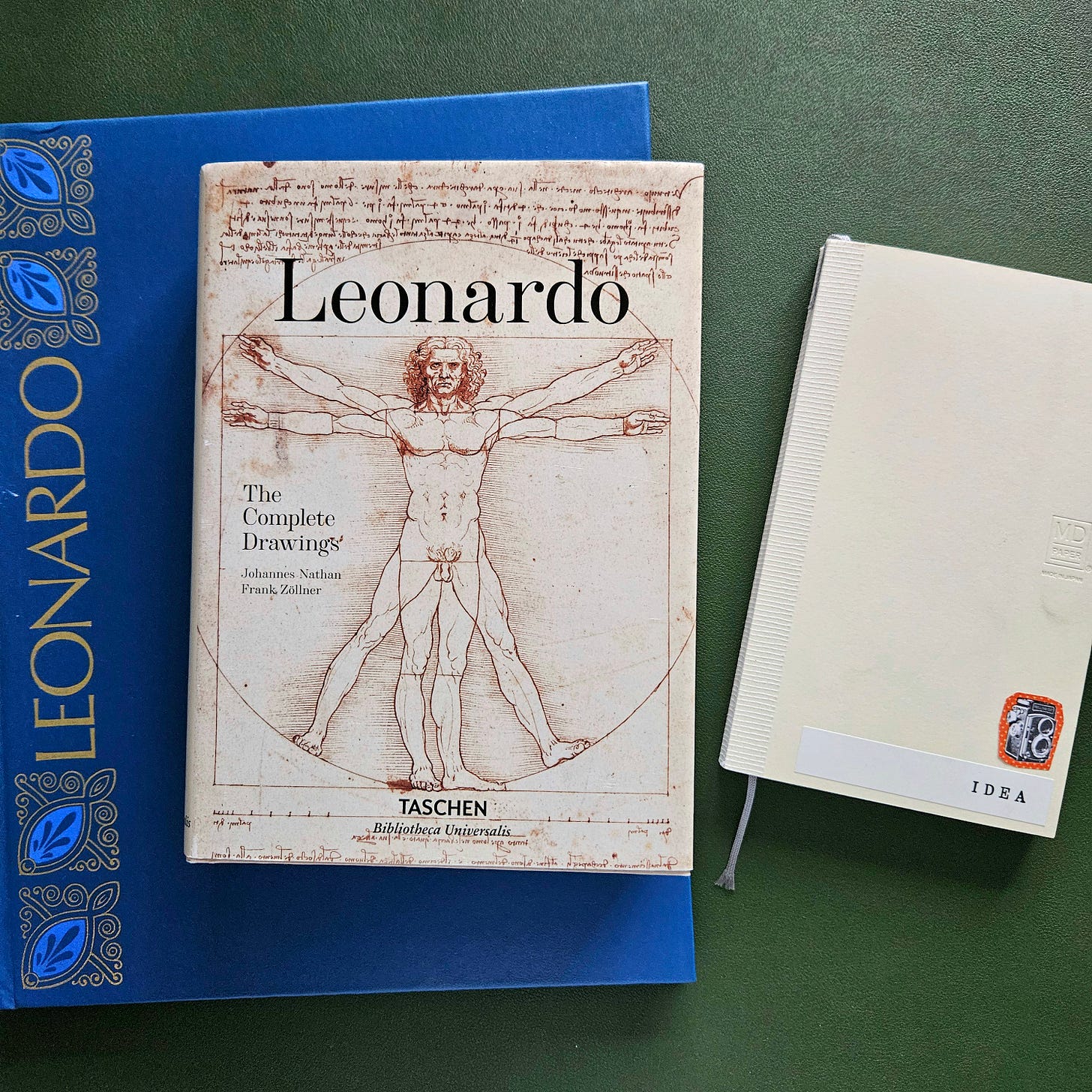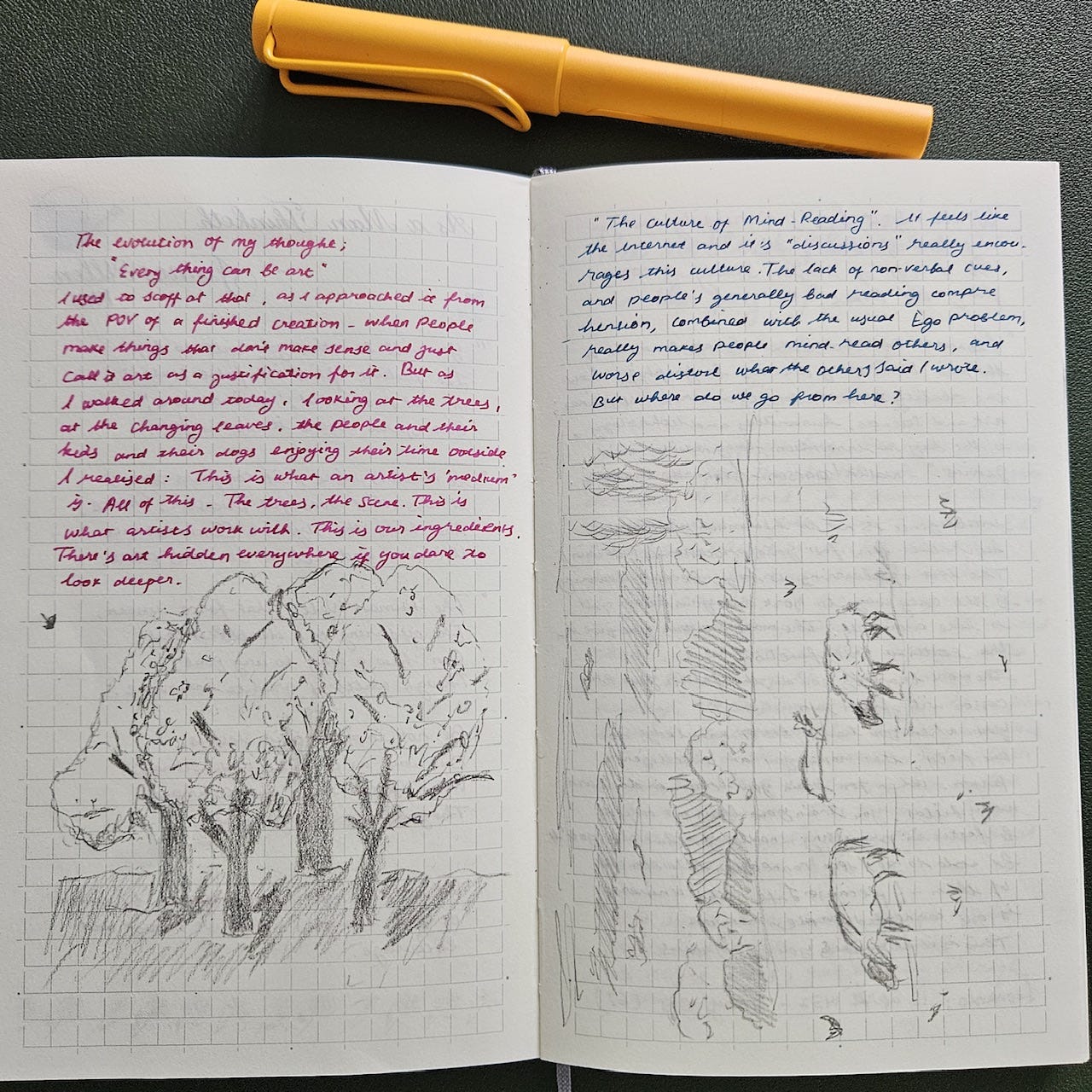Curiosity vs. Understanding, Leo’s Balancing Act
If Leonardo Da Vinci were alive today, how would he live his life? Would he still be the great master that we know him to be?
Buon giorno my friends, I hope you’re enjoying your weekend. Today I want to tell you about an interesting experiment I have been doing the past two weeks, I call it the Leo Immersion Project in which I fully immersed myself in his world in order to get the glimpse of how he thought and operated, and what lessons I can learn from him. I have a few sources in my personal library to help me with this; Leonardo Da Vinci biography by Walter Isaacson, The Life and Times of Leonardo by Paul Hamlyn from the Portrait of Greatness Series published in 1967, The Complete Drawings of Leonardo by Johannes Nathan and Frank Zöllner, and of course the myriad of free sources online. So much has been said about the great man himself, it’d be redundant for me to reiterate his life story here, but I did learn a thing or two about him that I didn’t know before. Such as that he wrote a series of fables and of course illustrated them himself, and that he invented a new musical instrument while he was at the court of Ludivico Sforza in Milan. I would highly recommend Walter Isaacson’s book if you’re interested in reading more about Leo, it is packed full of information but if you’d like something a bit more vintage and shorter read, Hamlyn’s book is very nice too.
Leo had an interesting lifestyle, and while I was eager to try and see the world from his perspective, I couldn’t do a few things, such as adopting his sleeping pattern (he only slept a total of 4 hours a day by doing 20 minutes power nap every four hours, this girl needs at least 6 hours of night sleep to function properly), his vegetarian diet, and his beard – well, that’s just not an option for me haha. Anyways, here are two important lessons I learned from this project.
1. Your notebook is your second brain.
We all know Leo was a prolific notebook-er (is that even a word?), so many of his notebooks were lost to time but we are very fortunate to still have quite a few of them around today. He wrote, drew, sketched in his notebooks all the things he needed to process and remember. So many great figures in history followed his footsteps, like Benjamin Franklin, Virginia Woolf, Mark Twain, etc. I would love to be able to read them all, imagine that… to have a peek at their immortalised minds.
The noblest pleasure is the joy of understanding.
Leo did use his journal in a way that it would enhance your thinking skills and understanding. When he was fascinated by flight, for example, he sketched many birds and wings as well as wrote notes of what information he gathered and how he processed them to help him understand better. This is such a great lesson. To make your thoughts less abstract by putting them on paper is powerful. Be it through writing alone or even better with additional sketches. What I also find encouraging is the fact that what you draw need not to be museum-worthy or amazingly realistic. A lot of his sketches are “unfinished” or “unpolished”, and yet we still marvel at them. My art teacher would say “it just needs to make sense to you”, granted he meant this for quick sketching rather than a study, but I think the principle can be adopted here too.
Draw to understand.
This approach to the act of drawing somehow relieves the pressure of drawing itself for me. It shifts the objective from drawing for other(s) to see, to your eyes first or even only. It takes that unnecessary pressure away. And this is a lesson I shall take to heart in my journaling habit.
I think Leo knew that our brains are a great memory storage. His notebooks were not only filled with idea explorations, but also to-do lists. But, Leonardo being Leonardo, his to-do list just had to be “extra”. His tasks consisted of experiments to conduct, calculations to make, places to draw, and questions to ask. Yes, questions to ask people about. For example, he wrote “draw Milan”, “have the master of arithmetic to show you how to square a triangle”, or “ask the wife of Biagio Cravelli (sp?) how the capon nurtures and hatches the eggs of the hen”. I love just how he chased people to teach him things.
His style of notetaking is known as Zibaldone, or Commonplace book. It is basically a book where you write everything you think is important. From quotes, drawings, passing thoughts, idea exploration, to… yes, task list. It is supposed to be very organic and for your eyes only. So many great figures in history adopted this system, for example Benjamin Franklin – in 1685 the English Enlightenment philosopher John Locke even wrote a treatise on commonplace books. In short, the point of commonplace book system isn’t to have a coherent idea, though it could be, but rather a birthplace of an idea. It is to gather, keep, and reread.

The idea of having a second brain to store information you haven’t internalised yet or to keep track of multiple tasks you don’t want to forget really appeals to me. This ideally frees our brains to do what it’s good at; processing. I’m reminded of an anecdote about Steve Jobs who decided to wear black turtlenecks all the time to eliminate the whole drama of “I have nothing to wear” in the morning before going to work – so he could concentrate on which fancy car to drive instead, perhaps… is it time for the blue one or is it the red one? This is my whole knowledge on fancy cars – just the colours ha!
In the past couple of weeks I have been applying this system, I would take my notebook with me when I go out and about, I would sketch when I see a view or something that catches my attention. I write down quotes from books I’m reading or podcasts I’m listening to. It doesn’t come naturally to me, yet, but two weeks is too early to form a habit. This is a lifetime project, ideally. I have a Pinterest board where I hoard quotes or words of wisdom, but I think because I’m more partial to tactility, my attitude towards digital notes tends to be more “out of sight out of mind”. I have better outcome of accomplishing my tasks if they are written down. I’m sure there’s a scientific explanation to that, but for now I’ll just call it magic until I know better, it sounds better.
2. Take time to digest what you’ve learned.
We live in the time where everything you wish to know is virtually at your fingertip. From podcasts, audiobooks, YouTube, Google, and a gazillion other media to consume, not to mention the good ole books. I often find myself binge-watching videos or podcast episodes – my headphones seem to be permanently attached to my ears – or reading one article and on to the next, but I wonder how much do I actually absorb? The other day someone mentioned a name that sounded familiar to me, I found out later that the person mentioned was a guest in a podcast I follow and that I actually enjoyed the episode. It was a sign, I needed to slow down.
Learning never exhausts the mind.
Leo lived before the time of internet – to state the most obvious – his only option was books, even then books weren’t as ubiquitous and they were not cheap either, and on top of that the knowledge available wasn’t as vast as it is today. So, he took it upon himself to investigate the world. His thirst for knowledge seemed to be unquenchable. He took his time to understand a particular thing he was investigating; he took his time with his projects too. When he took a commission work from the Duke of Milan to create a metal horse statue, his notebook pages were filled with sketches of horses, he took his time to understand his subject. And this is what I need to learn. It feels to me like the way I consume information/knowledge feels more like swimming in a pool, when you emerge you don’t take the water with you, only what little is on the body. Ok, that’s bad analogy, but it does feel to me that so much of the information I expose myself to was just passing through me. It is time to work on that.
To develop a complete mind; study the science of art, study the art of science. Learn how to see. Realise that everything connects to everything else.
The internet being virtually free and having a smartphone with me all the time means that I can learn as much as I want. I stimulate my brain almost in my every waking moment with outside influence, without giving it time to properly digest them. I would listen to podcast or audiobook while doing mundane, mindless chores, like doing the dishes or cleaning. But we often heard of people who wrote a great novel would say ‘I got the idea while washing the dishes’ or ‘I got the idea while in the shower’ – moments when your mind is busy with itself. I often say, “oh I keep this podcast or that in the background while I do X, Y, Z”, background being the keyword here; my attention was not there fully. And so, I wonder, how much of what I’m half-listening to actually sticks with me?
The other day, I did an “experiment”, I listened to an episode of David Eagleman’s podcast in which he talked about what is intelligence exactly, while doing house chores. Most house chores are pretty much mindless, I was surprised and disappointed that by the end of the evening I probably only remembered 50% of it! I didn’t even listen to anything else other than music after. So, I’m now thinking, maybe repeat listening with more attention given to it would be a good idea to try? And writing down what I want to hold on to. This means listening to a podcast while doing other things are a bit detrimental for learning, then?
The funny thing is, I already adopt this system of taking the time to digest what you’ve learned when it comes to books I read. I don’t go straight from one book to another, I would leave some down time in between to make sure I absorb everything I can, I would even write about the book – from the quotes I love to what wisdom I gather from it. I think the idea that everything on the internet is about the speed of its delivery – I’m not talking about Mbps but more of the instant nature of it and being in small bitesize (bytesize? Bad pun!) it becomes like eating a bag of crisps, snacking on empty calories. With books, you really set aside time to read each word and perhaps savour it, you devote your whole attention to it – you can’t really multitask with books, I’ve never heard of anyone doing the dishes while reading a book! It’s an investment of time and attention. Two most expensive commodities.
Another point worth mentioning I think is the fact that fast-paced bitesized information we consume daily on the internet may compromise one’s attention span, one would get bored easily. I worry about my attention span, and I think reading a book is a great practice for sustaining it. Well now this essay has become why we need to read more books ha!
It is useful to constantly observe notes and consider.
As I ponder more about the content I consumed to understand Leo’s life, as the ideas ferment even more in the back of my mind, as Life gives me more experience and my perspective inevitably changes, upgraded one hopes, I’m sure I’ll come up with more lesson(s) to share in the future. Right now, I’m still thinking about ways to keep one’s curiosity alive, practical ways. In the meanwhile, I hope this quote from Mr. Feynman would suffice:
Nobody ever figures out what life is all about and it doesn’t matter. Explore the world. Nearly everything is interesting if you go into it deeply enough.



